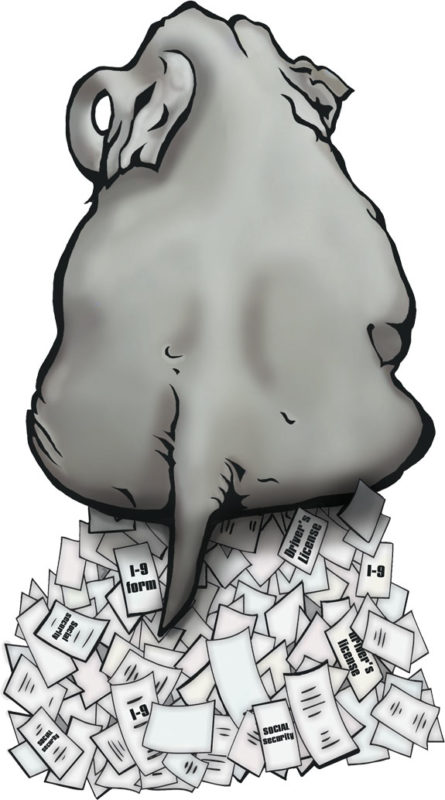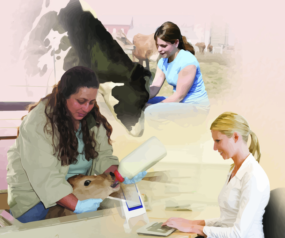“Warning! There is an elephant in the milk house!” Elephants are magnificent beasts, but an elephant is, nonetheless, unwelcome in the milk house. It fills all of the empty space. There is no exit wide and high enough to let it leave. So it remains. You do not see it? Therein lies the problem; the elephant is there and it is ignored or avoided. Dairy farming is a labor-intensive business. Proper feeding and caring of animals cannot be left to machines. It is not a pretty or easy job; it is hard, demanding and important.
The workplace is, at best, partially if not completely unprotected from heat and cold and the elements. And it means standing, walking, kneeling and working surrounded by fresh manure. Few are willing to work amongst this smell and muck.
To meet the labor needs on the dairy farm, immigrants have stepped forward to work in the barns and milking parlor. Immigrants work on farms from coast to coast and border to border, on the small, medium and large farms. The majority of milk produced in the United States today comes from farms employing immigrant labor.
Hiring immigrants comes with uncertainty. It is illegal to knowingly hire an alien who is not authorized to work in the United States.
Really knowing who is and who is not authorized is not so easily determined. Under the law, the determination is made through the Form I-9 process. It is a one-page form.
The would-be employee swears under oath that he or she is authorized to work in the United States. In support of the statement, the applicant presents documents showing work authorization (generally a Social Security card) and an official photo ID (often a driver’s license.)
Dairy farmers, like practically all employers, are not trained in document forensics. Rather, the employer must accept the documents if they facially appear to be what they represent.
Employers then note the relevant information from the documents and sign the form. Until shown otherwise, under the law, the dairy farmer has hired a person authorized to work in the United States. In general, good faith compliance has been a complete defense to the hiring of undocumented workers.
But if that person hired is not legally allowed to work in the United States and the documents were not done right, or other information is known by the dairy farmer, the defense disappears. Immigration and Customs Enforcement (ICE) randomly audits the reports. Raids, fortunately rare, chase away employees.
Dairy producers do not want to hire illegal aliens. They want a supply of labor which has no questions as to its legitimacy. There is no such certainty. Current law will not provide it. That is the elephant in the milk house.
There is another issue as well. It is not just that dairy farmers need immigrants to work their farms; by and large, they want those already working for them. They are trained; they are loyal. Simply stated, they are great workers.
As a result, the legislative agenda for dairy farmers has been twofold – a process that provides, with certain legality, immigrant workers and also offers an avenue for those here to clarify their legal status. This was the promise of AgJobs and other similar legislation. This has been the answer to the elephant.
The immigration issue facing Congress is complex and large. The immigration issue is more than workers for dairy farmers.
If all 35,000 to 45,000 immigrant workers estimated to be working on dairies were undocumented (which is not the case), they would still represent only a tiny, tiny portion of the estimated 11 to 12 million illegal aliens in America. Because of this, dairy farmer interests are not driving the debate in immigration reform.
Instead, the elephant has grown and is getting feisty. Call it good, bad, ugly, racist, patriotic or something else, the truth of the matter is that a very large portion of the voting population opposes allowing illegal immigrants to stay in the country. They see immigrants differently than do dairy farmers.
To dairy farmers, immigrants are vital parts of their business. They have good values, are loyal and are an asset to the operation.
Others look beyond dairy farm workers and see tax evasion, lower wages, overburdening of public medical services, undermining of education, excessive demands on welfare programs, weakening of national security, increased criminal activity, drug trafficking and other evils. There is an ever-growing chorus for changes in immigration policy and a rejection of the status quo.
Congress has failed to address immigration because it cannot agree on what to do with those 11 to 12 million immigrants already here. Some say remove them; others say provide a path to legitimacy. Emotions run high on both sides of the issue. No middle ground appears.
Frustrated at the inability of Congress to solve the problem, voters have turned to their state legislatures to address illegal immigration. And legislatures are responding with laws.
According to the National Conference of State Legislatures, last year 46 of the 50 states passed laws dealing with immigration and illegal aliens. The four that did not were not in session.
While the U.S. Constitution gives Congress the right to regulate citizenship and naturalization, the states can, with some limits, regulate employment, establish rules for commerce within the state, set standards for contracting with state and local governments, issue driving and professional licenses and tax.
Claiming this authority, states are passing laws addressing the issue of immigration in the areas of employment, identification, criminal activity, housing, education, medical care, public works, licensing and permitting, official language and other facets of modern life.
In the process, the elephant grows even bigger and grows more restless. Through various maneuvers, states are pushing to force employers to abandon the I-9 process and use E-Verify, a voluntary program under federal law. Failure to use E-Verify can, in some states, result in loss of business permits, including dairy producer permits.
Other states have defined the crime of harboring or transporting aliens in such a way that a dairy farmer providing housing as part of employment to an alien or allowing him to drive machinery can be guilty of this felony. Besides criminal penalties, loss of the property involved is also included. Defenses available in employment under Form I-9 do not apply.
Not all states have opposed dairy producers. Utah passed a gentler immigration law known as “The Compact.” The sponsors of this bill recognized that mere enforcement of immigration laws was too little and too late to solve the problem. The bill acknowledges that some illegal immigrants are constructive contributors to society and the economy by working.
The Compact was passed in three separate bills. HB116, the one of most interest to dairymen, included a unique feature in the establishment of a temporary guest worker program. Implementation will begin July 1, 2013, or 120 days after receiving a waiver from the federal government, whichever comes earlier, and seeks federal waivers to implement the program by July 1, 2013.
Sponsors acknowledge that without a federal waiver, it is probably unconstitutional. Congress must still act.
As promising as it is to have a guest worker bill, the Utah Compact is not the full answer to dairy producers. It provides no additional workers to meet the needs of Utah dairymen. Prospective guests must have worked or lived in Utah before May 10, 2011, not be a convicted felon, meet the public health standards for immigrants and have a valid driver’s license.
The applicants would pay a fine of $1,000 if admitted to the U.S. legally and $2,500 if here illegally. Permit holders must make good-faith efforts to become proficient in English and be employed within 30 days.
The agency issuing guest worker permits uses a procedure similar to E-Verify to determine legal status. Here is the rub: If the person is employed legally, he needs no permit.
Under federal law, an employer is prohibited from hiring an individual if he entered legally but his visa has expired or his status has changed (from student to employee, for example) or if he entered illegally. The process of issuing permits in Utah will identify those who are here legally or not. For those who are not, even with a state permit, employees would not be eligible to work.
Meanwhile at the federal level, several senators have introduced a Dairy H2A program. Senate Bill 852, if enacted into law, would issue three-year visas for work on a dairy farm through a simplified system.
This bill, largely drawing from the work of NMPF and its immigration task force, would address the issue of supplying dairy farmers with a work force that is unquestionable.
The H2A addresses the key issue to dairymen – having a workforce. It does not, nor will it, address the legal status of those here already. Because of that, it has a strong chance of passing.
But before Congress addresses this bill, it must first decide how to respond to the millions of illegal aliens in the country now.
Such a legislative moment is a long way off. Many believe the contentious issue of immigration will be ignored until after the presidential election next year, which means at least two more years of the current state.
In the meantime, the elephant will still be in the milk house. It cannot be ignored. Dairy farmers face its reality and develop strategies to handle it.
For the time being, legislation at the state and national level will not help, and will most likely hurt, the situation. With the advice of an immigration lawyer, dairy farmers must carefully adhere to the Form I-9 process and subject it to routine audit to ensure compliance.
Dairy farmers invited the elephant into the milk house. They need to see it for what it is. Adherence to Form I-9 process, audits of the process and regular consultation with an immigration issue attorney will keep it at bay.
But with so much at risk, they should also think of alternatives in terms of staffing and technology to uninvite the elephant. PD

-
Ben Yale
- Attorney
- Yale Law Offices
- Email Ben Yale







